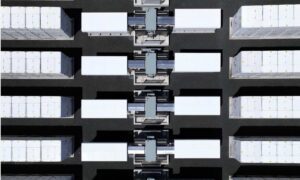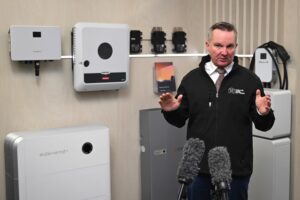“At the risk of being a little bit controversial, I think today’s rooftop solar market is broken.” That was major message that the head of Origin Energy’s solar business, Phil Mackey, delivered at RenewEconomy’s Disruption and the Energy Industry conference in Sydney on Tuesday. And it was, just a little, controversial.
Mackey said solar is great, and cheap, and that it’s great that it’s cheap: “Solar is the cheapest form of energy” to get in the house, he said.
But Mackey said there had been a market failure, the result of an incentive-driven boom that he said had been under-regulated, and left a legacy of problems – namely, underperforming solar systems – that has been built into the market.

“Many solar systems out there that just aren’t working, and unfortunately customers don’t know that.” Mackey told the conference. “A lot of systems won’t last 15 years, even though subsidies assume they will.”
Mackey’s main concern seems to be for the customers out there with rooftop solar systems installed by what his boss Grant King sometimes describes as “fly-by nighters”, or solar companies that have since disappeared into the ether, leaving customers with no line of service if things go wrong.
Those “Things That Could Go Wrong” range from underperforming systems, mostly due to sub-standard inverters, to systems that he said could even pose a danger to customers, including the risk of fire.
But Origin Energy is also at fault, as it has admitted. In its last accounts, it wrote off $17 million from the cost of having to replace sub-standard inverters installed by its own people. Like many in the industry, the initial solar boom encouraged a lot of customers to install the cheapest and quickest products.
While Origin is being congratulated for stumping up the cash to fix the problem, its apparent attack on the broader industry is seen by some as a little disengunuous considering its own rating for quality was criticised by Choice magazine, who noted that 20 per cent of consumers gave the company a negative rating.
Muriel Watt, a former chair of the Australian PV Institute, and solar expert at the UNSW, asked Mackey if the real problem was not the overall quality of the systems, but the fact that major players such as Origin Energy and AGL Energy had such a low market share.
“Both AGL and Origin – who campaigned strongly to reduce the RET – are now re-badging themselves as the trusted retailer who can provide a safer solar option, compared to third party suppliers,” she told RenewEconomy on the sidelines of the conference.
“Origin says the solar market is broken – maybe this is because third parties have largely captured the market and not them?” (According to Mackey, Origin currently has so far installed just 1MW of solar PV capacity under its new power purchase agreement scheme.)
“They also say they are seeing lots of non-performing systems, due to poor quality product and installation – maybe this is because Origin was one of the companies that used low cost products and installation and, according to Choice, has the highest complaint rate.”
But Watt says this does not reflect Australia’s whole PV market, which is still going strong with low installation faults and few serious accidents.
Although there had been relatively few incidents in Australia, none of which has not resulted in any serious injuries or damage, Mackey even raised the prospect of a repeat of a “pink batts” moment, and said that could force intervention in the market and the removal of incentives.
“A lot of people buying solar systems in Australia than banks wouldn’t buy,” said Mackey.
“We need to get ahead of these risks. Energy retailers and providers have a big role to play in that, supporting customers , sending the right signals to the market.
“We’ve already lost a lot of bark in this game, so we’re very sensitive to inverter and panel quality.
“There are a lot of poor signals, and sources of information out there. We need to fix that …to manage the risk. Leave it in our hands, we’re in a better position to manage it.”
AGL’s head of New Energy Marc England stopped short of calling the rooftop solar market “broken” – although he did describe battery storage systems as “the most dangerous things we’re ever going to put in our houses”.
He agreed, however, that a lot of the PV systems on roofs today were not operating as well as they should, and said that because of this, the risk of “bad disruption” had been heightened.
Australia’s is in the “dumb distributed energy” phase of the market transformation, England told the conference on Tuesday: “like a gold rush,” he added, driven by incentives, and delivering a one-off boon to a select few, including electricians.
“Nothing is connected, and people with solar systems on their roof have no idea if they’re performing.”
According to data cited by England, 80 per cent of installed rooftop solar systems in Australia were not performing as they should, and 19 per cent were performing below par.
Solar systems that with a shorter life than was promised, he said, “could be a ticking time bomb that could damage the solar industry.”
In order to avoid this kind of “bad disruption” (England himself prefers the term “transformation” to “disruption”), the new phase must have a focus on differentiation and sophistication; integration, management, explanation and value creation.
Watt says it would be wrong to put rooftop solar on par with the “pink batts” debacle.
“The PV roll-out most definitely can’t be compared to that – it was done with standardised grid connect procedures, trained and licensed installers, many with years of experience with PV, using products meeting Australian standards,” she said.
“Sure, there were some shoddy products and operators, but the Clean Energy Regulator inspection system soon got bad companies and products out of the market and ensured poor installs were fixed.”







